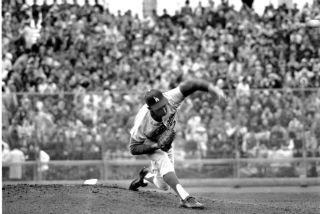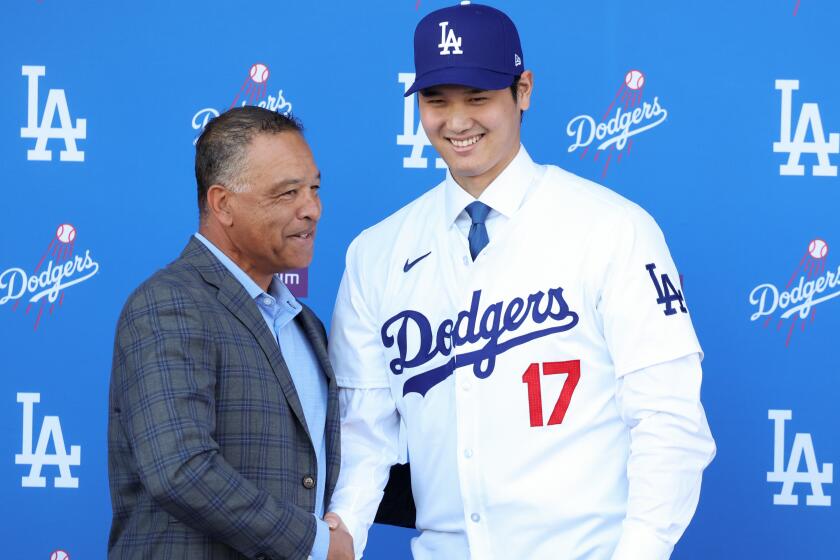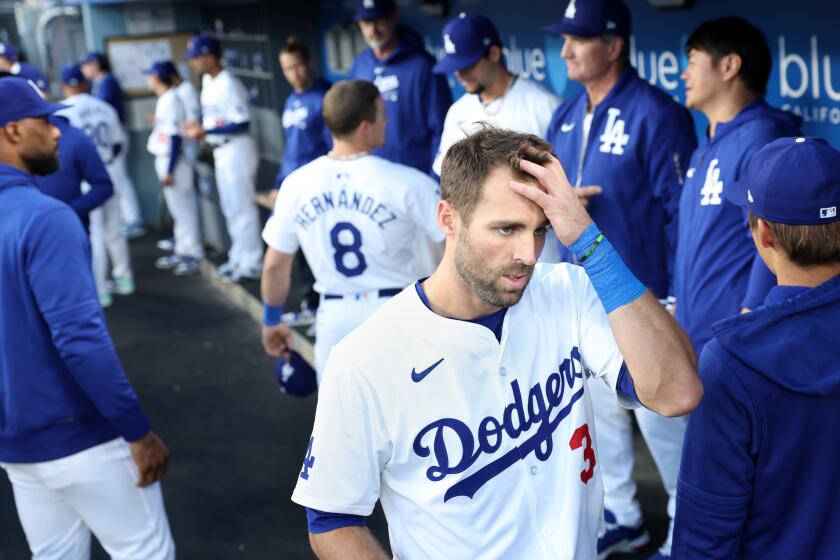ARCH ENEMY
“Horse Face!”
The insult, despite emanating from the distant outfield seats at the cavernous Polo Grounds, would cut through the cheers and boos of the New York Giants’ home crowd to reach its target in center field: Brooklyn’s Duke Snider.
Again and again, the man in the heavy coat, worn in the heat of summer as well as the cool of early fall, would blister the Dodgers’ outfielder with his insult. And again and again, Snider would fume.
In 1958, the two teams moved west. The Los Angeles Dodgers would play their first game, fittingly, against the Giants at San Francisco’s Seals Stadium.
As the Dodgers stepped off the team bus, Snider heard a familiar voice -- agonizingly familiar.
“Hey, horse face,” said the man, still wearing his trademark coat, “thought you got rid of me, didn’t you?”
Not a chance. After more than half a century of one of sports’ greatest rivalries, Dodgers vs. Giants, New York borough against New York borough, that fan served notice that a little thing such as moving nearly 3,000 miles would in no way diminish the intensity and animosity generated by the two teams.
It may have become city vs. city, but it was still the Dodgers against the Giants.
Whether it was the dueling bats of Willie and the Duke, the knee-shaking brushback pitches of Sal Maglie and Don Drysdale or the high-kicking style of Sandy Koufax and Juan Marichal, this has been a rivalry played by some of the most skilled performers and colorful characters to ever put on a baseball uniform.
The rivalry continues this weekend, with a three-game series beginning tonight at Dodger Stadium, the Dodgers trying to hold on to their lead in the National League West, the Giants trying to knock them from the perch.
Sometimes they played with a pennant on the line, sometimes not. But that didn’t matter. The mere sight of each other stirred the emotions.
Snider said he couldn’t even enjoy Halloween because it reminded him of the Giants’ colors, black and orange.
“It was a season within a season whenever we played them,” said former Dodgers shortstop Maury Wills, now a part-time Dodgers coach. “You didn’t need a Knute Rockne speech before a Giants game. If a player couldn’t get up for the Giants, he didn’t have any fire in him. It was war. It was life or death.”
Like the heart-wrenching moment in the 1960s when Wills, his family still in Spokane where he had played minor league ball, got a call from his wife’s gynecologist.
“She was pregnant and he told me there had been some complications,” Wills said. “He told me we might lose the mother or the child and that I should get back there. ‘But,’ I told him, ‘we are playing the Giants.’ ”
Wills elected to stay with the team. His wife, Gertrude, recovered, but the baby was stillborn.
Two moments, one from each coast, best illustrate the passion and the fury generated by the two teams.
The passion: It filled the Polo Grounds as Giants outfielder Bobby Thomson flew around the bases, his feet barely touching the ground, with announcer Russ Hodges yelling, “The Giants win the pennant!” over and over like a broken record after Thomson hit the Shot Heard ‘Round the World, a 1951 pennant-winning home run in the deciding game of a playoff against the Dodgers. That shot is found at the top of many lists of the most memorable home runs of all time.
The fury: It was captured in one of baseball’s most famous photos, the 1965 picture of Marichal, bat clutched in right hand, hanging over a stumbling John Roseboro, a dazed look on the Dodgers catcher’s face and blood on his head. Behind him is a terrified Koufax arriving from the mound, trying to make sense of the situation, support Roseboro and disarm Marichal.
It was the ugliest moment of the long rivalry. After Marichal had thrown knockdown pitches at several Dodgers hitters, Koufax was expected to respond, but he didn’t do that kind of thing. So Roseboro responded, whipping a pitch back to the mound dangerously close to Marichal’s nose. The Giants pitcher snapped, cracking Roseboro so hard with his bat that he opened a two-inch gash on the catcher’s head.
“I remember trying to get to Marichal,” Roseboro, who died in 2002, told The Times years later. “He was at the mound using his bat as a sword to hold people off. I remember Willie Mays telling me to stop fighting because my eye was out.”
Fortunately, that wasn’t the case.
Knockdown pitches have often served as the fuel to inflame the emotions of the two teams.
Right from the beginning.
Carl Erskine was the starter for the Dodgers’ first game in Los Angeles, April 18, 1958, at the Coliseum against the Giants in front of 78,672 fans.
“Before the game,” Erskine said, “Manager Walt Alston told me, ‘The Giants have this kid, Jim Davenport, who has had a hot spring. I want you to get a strike on him, then flatten him. Let him know he’s in the National League. I know you don’t like to do this, so I’m not asking you. I’m ordering you.’
“I really wanted to throw a strike anyway because, I thought, symbolically the first pitch in Los Angeles should be a strike. I threw a fastball, got the strike, and then, with the next pitch, did a really good job of knocking Davenport down, his cap flying in one direction, his bat in the other. He got up, dusted himself off and, on the next pitch, singled off the screen in left field. I looked over at Alston in the dugout and he just shrugged.”
Former Dodgers pitcher Don Newcombe, now the team’s director of community relations, remembers a similar moment.
“I was told I had to throw at Willie Mays with my first pitch or it would cost me $50,” Newcombe said. “ ‘I’ve got to throw that first pitch at you,’ I warned him. ‘That’s OK,’ Willie said, ‘I can hit the second pitch.’ ”
The Giants had their own forms of retribution. San Francisco Manager Alvin Dark once ordered the area around first base watered so heavily that it nearly turned into mud in an effort to slow down Wills, the base-stealing king of his day.
The fans also got involved when the Giants called Candlestick Park home. To get to the clubhouse, the Dodgers had to walk down the right-field line. That enabled fans to shower them with everything from beer to batteries.
“Add the wind and the fog and the cold,” Roseboro said, “and those nights up there were among the worst nights of your life.”
Worst nights. Best nights. There were plenty of both when the Dodgers played the Giants.
--
--
BEGIN TEXT OF INFOBOX
Great moments in Dodgers-Giants history
The Dodgers and Giants have a long history of playing spoiler against one another. The most famous instance occurred in 1951, when Bobby Thomson hit a home run in the bottom of the ninth inning of the deciding game of a three-game playoff, capping the 13 1/2 -game late-season comeback by the Giants that came to be known as the “Miracle of Coogan’s Bluff.” Some other late-season dramatics involving the two rivals:
1962: The Dodgers again found themselves in a playoff with the Giants, again leading in the ninth inning of the deciding game only to collapse. This one was painful in a different way. The Dodgers not only gave up four runs in that final inning at Dodger Stadium to lose 6-4, but right-hander Stan Williams walked in the go-ahead run and an error added an insurance run.
1982: With a chance to catch the Atlanta Braves by winning on the final day of the regular season, the Dodgers were beaten by the Giants at Candlestick Park on a three-run, seventh-inning homer by Joe Morgan.
1991: The Dodgers headed to San Francisco for the final weekend of the season tied with Atlanta. While the Braves were winning two out of three against the Houston Astros, the Dodgers lost two out of three to the Giants to finish a game back.
1993: The Dodgers, playing at home, eliminated the Giants from postseason play on the final day of the regular season.
2004: The Giants came into Dodger Stadium for a season-concluding three-game series needing a sweep to tie the Dodgers for the division title. After losing the first game, the Dodgers clinched first place by winning on a ninth-inning, walk-off grand slam by Steve Finley.
-- Steve Springer
More to Read
Are you a true-blue fan?
Get our Dodgers Dugout newsletter for insights, news and much more.
You may occasionally receive promotional content from the Los Angeles Times.






